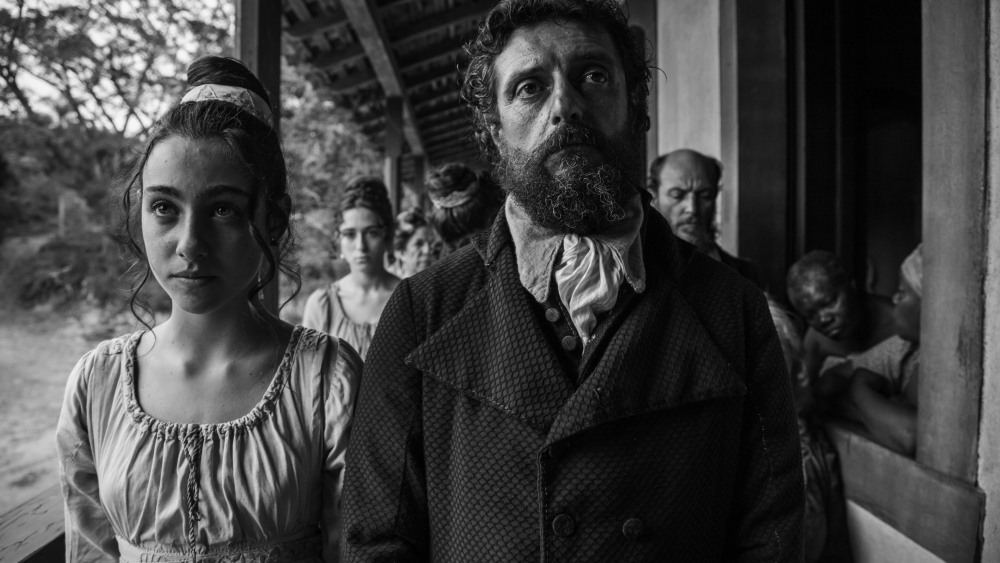
VAZANTE
Music Box Films
Director: Daniela Thomas
Screenwriter: Daniela Thomas, Beto Amaral
Cast: Adriano Carvalho, Luana Nastas, Sandra Corveloni, Juliana Carneiro Da Cunha
Screened at: Critics’ link, NYC, 1/6/18
Opens: January 12, 2018
1821 was a very good year—if you were King George IV of England—but not if you were born or shipped to Brazil as a slave. If you resent the patriarchy in America, the behavior of white males in important positions, be thankful that you do not have to undergo the humiliation of enslaved people in the mining areas of Brazil, a country that imported more slaves via Luanda than any other state in the Western Hemisphere. Forty percent of all such unfortunate people sent to our hemisphere went to Brazil, where slavery was the peculiar institution even before the Portuguese traveled to the New World. Brazilians must have liked the institution: they were the last to emancipate all, in 1888.
“Vazante,” or “The Surge” tells the story of one family, folks of all ages, living in a shack that looks nothing like the plantations you’ve seen in “Gone With the Wind,” but still, if you owned the place and you possessed a dozen slaves to work the mines or do some planting, you did some heavy work. Maybe you moved some cattle from place to place, riding a horse like an Argentine gaucho or relaxing in a hammock on your porch, ordering the African women to bring you not mint juleps but perhaps cachaça, the national drink.
“Vazante” is quite an impressive job from director Daniela Thomas, a Carioca who presumably lives better than even the owner of this dilapidated plantation in the Diamantina Moutains. As in antebellum America, the owner of these people who are often chained, marching as a team from the field or tied to trees to “break” them, could have his way with the women, and as shown in one quick scene, with the young African boys as well. Though filmed by Inti Briones in black and white, the rugged beauty of the area is apparent, the absence of color accentuating the primitive lives of the people far away from what would become Ipanema Beach.
The stage is set for drama when Antonio (Adriano Carvalho), the owner of the farmhouse seen leading a group of fresh slaves and oxen, learns that his wife has died in childbirth as well as the baby. He is now not only a widower but the son of a senile mother-in-law (Juliana Carneiro Da Cunha), who gazes about listlessly, occasionally shoveling gruel into her mouth. One slave (Toumani Kouyate), who gives the movie audience the impression that he will lead a Nat Turner-style rebellion, speaks a different language. His inability to communicate fills him with a rage that a freed African, Jeremias (Fabricio Boliveira), both an Uncle Tom and a Simon Legree, insists that he can handle. Jeremias is valuable as well as he knows how to plant, a necessity for raising money when the diamond mines have dried up.
Antonio takes Beatriz (Luana Nastas), daughter of his brother-in-law (Roberto Audio), in marriage, a 12-year-old with whom he does not consummate his marriage until she has her menses. Otherwise, he’s no Mr. Right. He gets off with Feliciana (Jai Baptista), as masters had been wont to do with the enslaved. For her part, Beatriz hangs out with Feliciana’s son Virgilio (Vinicius Dos Anjos), a choice that will lead this slow-paced, reasonably quiet story to burst into frightful melodrama.
With the help of co-scripter Beto Amaral, Ms. Thomas has no problem challenging the probable art-house crowd to keep patient, given the long takes and the occasional, dramatic close-up. Though I haven’t been anywhere in Brazil in 1821, I would bet that the scene is as authentic as you can get, probably backed up by the counsel of historians impressed by the 17th century discovery of emeralds, gold and diamonds in Minas Gervais. This led to a rush of Portuguese to colonize that vast land. As a film “Vazante” is a gem in itself, graced with serious performances albeit without the usual infusion of humor that filmmakers throw in for comic relief. Life looks hard, whether you’re a gaucho of an enslaved person. Aren’t we lucky all that baggage is now gone and Brazil is, like the U.S., a land of a multi-cultural population? Some political scientists have even praised the concept of Brazil’s “coffee-colored compromise” as a solution to racial hostility, an interesting label especially considering that, as Frank Sinatra told us, “They have an awful lot of coffee in Brazil.”
Unrated. 116 minutes. © 2018 by Harvey Karten, Member, New York Film Critics Online
Story – B+
Acting – A-
Technical – B+
Overall – B+





